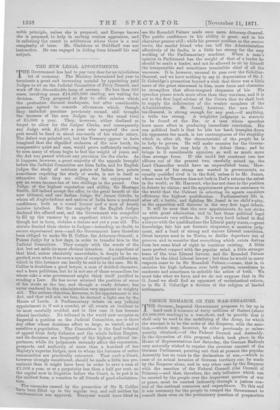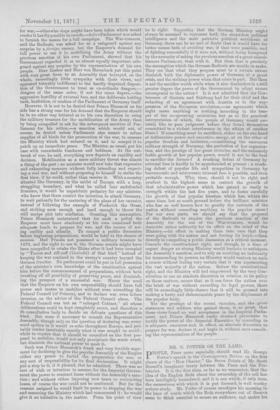PRINCE BISMARCK ON THE WAR-TREASURE.
THE German Imperial Government proposes to lay up in hard cash a treasure of forty millions of thalers (about £6,000,000 sterling) in a war-chest, and to provide that it shall only be used in the mobilizing of the Army, for which the warrant is to be the order of the Emperor, with the sanc- tion,—which may, however, be either previously or subse- quently obtained,—of the Federal Council and Assembly. In the discussion of this proposal, which took place in the House of Representatives last Saturday, the German Radicals very naturally wished to require the previous consent of the German Parliament, pointing out that at present the popular Assembly has no voice in the declaration of war,—which in case of an actual invasion of German territory can be made by the Emperor alone, and in any other case by the Emperor with the sanction of the Federal Council (the Council of Princes),—and that, therefore, the only influence which can be exerted by the people over the important question of war or peace, must be exerted indirectly through a Jealous con- trol of the national resources and expenditure. To this end it was necessary for the people to compel the Government to consult them even on the preliminary question of preparation for war,—otherwise steps might have been taken which would render it hardly possible to recede,—kforeParliament was asked to furnish the means for a full campaign. The War-treasure, said the Radicals, was asked for as a safeguard against any surprise by a foreign enemy, but the Emperor's demand for full power to use it in mobilizing the Army without the previous sanction of his own Parliament, showed that his Government regarded it as an almost equally important safe- guard against any surprise by the representatives of his own people. Herr Luker and Herr von Hoverbeck put this point with very great force to an Assembly that betrayed, on the whole, exceedingly little sympathy with their views, and appeared tolerably indifferent to the hardly disguised disposi- tion of the Government to treat as co-ordinate dangers,— dangers of the same order, if not the same degree,—the aggressive hostility of external foes, and the deliberate holding back, hesitation, or caution of the Parliament of Germany itself. However, it is not to be denied that Prince Bismarck on his side has a strong ease for his demand that the Emperor should be in no other way fettered as to his own discretion in using the military treasure for the mobilization of the Army, than by being compelled to ask for the subsequent sanction of Par- liament for his action,—a sanction which would not, of course, be denied unless Parliament also meant to refuse supplies of all kinds for the prosecution of the war, to censure the Ministry which had entered on it, and to compel it to patch up an immediate peace. The Minister, as usual, put his case with remarkable frankness and boldness. At the out- break of war, he said, everything now depends on rapidity and decision. Mobilization as a mere military threat was almost a thing of the past ; no minister would now take that expensive and exhausting measure without fully intending and expect- ing a real war, and without proposing to himself to strike the first blow, if he could, rather than receive it. With a country situated like Germany, in the midst of Europe, with a long, straggling boundary, and what he called four undefended frontiers, it would be unpatriotic pedantry for any minister, who knew that there existed the intention to attack Germany, to wait patiently for the maturing of the plans of her enemies, instead of following the example of Frederick the Great, and striking soon enough and hard enough to throw the still unripe plot into conrusion. Granting this assumption, Prince Bismarck maintained that for such a policy the Emperor must have absolutely at his own command both adequate funds to prepare for war, and the means of act- ing swiftly and silently. To compel a public discussion before beginning preparations, would be fatal to the chance of success. Had Prussia not possessed a military treasure in 1870, and the right to use it, the German armies might have been compelled to retake the Rhine after it had been occupied by " Turcos and riff-raff (Gesinclel) of that kind," instead of keeping the war confined to the enemy's country beyond the German frontier. No parliament could be put in full possession of the minister's own knowledge of the combination against him before the commencement of preparations, without both breaking off all possibility of preserving peace, and diminish- ing the prospect of a successful war, Hence the need that the Emperor on his own responsibility should have full power and means to mobilize without even consulting the Federal Council (of Princes), and to declare war, oven before invasion, on the advice of the Federal Council alone, The Federal Council was bat an " enlarged Cabinet," all whose deliberations could be kept completely secret, and therefore a fit consultative body to decide on delicate questions of this kind. But were it necessary to consult the Representative Assembly, though only on the question of declaring war, every word spoken in it would re-echo throughout Europe, and pro- bably render inevitable exactly what it was sought to avoid ; while to require that it should be consulted on the first pro- posal to mobilize, would not only precipitate the worst event, but diminish the national power to meet it.
Such was Prince Bismarck's frank and very forcible argu- ment for declining to give the popular Assembly of the Empire either any power to forbid the preparation for war, or any sort of responsibility for its final declaration. It might put a stop to it, if it pleased, that he admitted. There was no sort of wish or intention to assume for the Imperial Govern- ment the power to contract loans without the Assembly's sanc- tion; and without either imposing new taxes or contracting loans, of course the war could not be continued. But for the reasons assigned he would limit its power to stopping the war and censuring the Ministry which had commenced it ; he would give it no initiative in the matter. From his point of view
- -- he is right. Supposing that the German 'Ministry might always be assumed to represent both the shrewdest political intelligence and the most patriotic political sentiment of Germany, there can be no sort of doubt that it would have far better means both of avoiding war, if that were possible, and of fighting successfully if it were not, without being hampered by the necessity of asking the previous sanction of a great miscel- laneous Parliament, than with it. But then that is precisely the assumption which the German Radicals are unable to make. They see that what they propose must to a certain extent diminish both the diplomatic power of Germany at a great crisis, and the striking power when that crisis is past. But then is not the sacrifice worth while when it also diminishes in a still greater degree the power of the Government to adopt oauses uncongenial to the nation ? Is it not admitted that the Con- ferences of Gastein and Salzburg had for their chief end the redacting of an agreement with Austria as to the sup- pression of the European revolution,—an agreement which mght mean anything or nothing, according to the tem- per of the co-operating ministries, but as to the practical interpretation of which, the people of Germany would cer- tainly like to pass judgment before they found themselves committed to a violent interference in the affairs of another State ? If something must be sacrificed, either on the one hand of deliberative power and executive energy, or on the other of popular freedom and initiative,—considering the enormous military strength of Germany, the perfection of her organiza- tion, and the prestige of her great victories, and the extremely feeble growth of her popular power, would it not he the best
to sacrifice the former A crushing defeat of Germany by external foes is hardly to be apprehended at present ; a crush- ing defeat of popular life and sympathies in Germany by bureaucratic and aristocratic internal foes is possible, and even probable enough. Why, then, should it not be right and prudent in the highest sense to restrict the growth of that administrative power which has gained so vastly in strength within the last five years, and to foster carefully the growth of that popular freedom which has, within the same time, lost so much ground before the brilliant minister who has so well known how to gratify the instincts of the nation without conceding anything to the popular cause ? For our own parts, we should say that the proposal of the Radicals to require the previous sanction of the Assembly for the use of the War-treasure, would be desirable rather indirectly for its effect on the mind of the Ministry,—its effect in making them take care that they were going with the nation and not forcing its hand,---than directly in compelling a public discussion at a critical moment. Concede the constitutional right, and though, in a time of urgent danger no strong Ministry would hesitate to anticipate the Assembly's sanction, and to rely on receiving an indemnity for transcending its powers, no Ministry would venture on such a course without feeling very certain that it was representing the vast majority of the nation. Refuse the constitutional right, and the Ministry will feel empowered by the very Con- stitution to use an absolute discretion in relation to its policy on these matters, secure that as it can force the nation over the brink of war without exceeding its legal powers, there will be exceedingly little chance that it will be pressed into making a hasty and dishonourable peace by the displeasure of the popular body. Yet the prestige of the recent victories, and the great statesmen and soldiers who gained them, is so great, that these views found no real acceptance in the Imperial Parlia- ment, and Prince Bismarck easily obtained permission to fortify the power of the Imperial Executive by conceding to it adequate resources and, in effect, an absolute discretion to prepare for war, declare it, and begin it, without once consult- ing the representatives of the people.



































 Previous page
Previous page